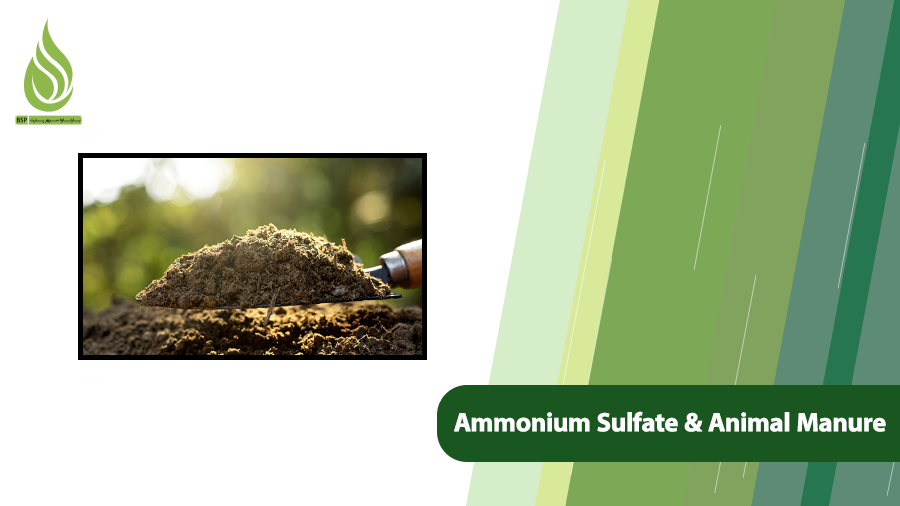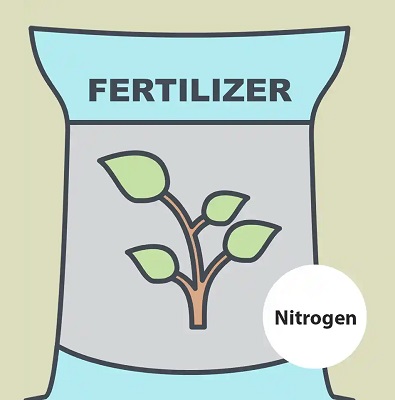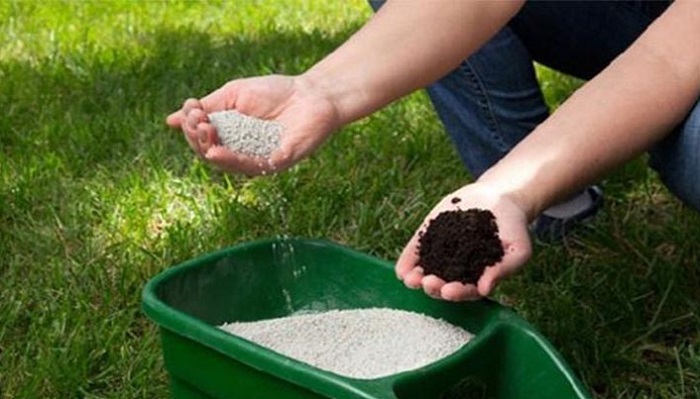
Why Combine Ammonium Sulfate Fertilizer and Animal Manure?
Soil is the foundation of plant and tree growth, and its quality directly impacts agricultural productivity. Reviving soil through the right mix of fertilizers is a proven strategy to boost crop yields and ensure long-term sustainability. Research and experiences show that blending ammonium sulfate fertilizer with animal manure creates optimal growing conditions for plants, enhancing nutrient availability and soil health. In this guide, we’ll explore key insights on combining ammonium sulfate and animal manure and provide practical, evidence-based advice to help farmers improve their soil and yields.
Why Does Agricultural Soil Weaken Over Time?
Soil serves as the primary base for producing agricultural crops, but continuous farming practices can degrade it. Over years of intensive cultivation, excessive irrigation, unplanned chemical fertilizer use, and nutrient leaching erode soil fertility. As a result, plants face deficiencies in essential elements, leading to stunted growth and reduced yields. One of the most effective ways to restore tired or depleted soils is by using a combination of organic and mineral fertilizers.
Proper fertilization acts like targeted therapy for the soil. The right blend of organic and chemical fertilizers delivers fast-acting nutrients to plants while gradually repairing soil structure. Among various options, pairing ammonium sulfate, a nitrogen-rich mineral fertilizer, with well-composted animal manure stands out as an excellent choice for nutrient-poor soils.
Soil degradation affects about 33% of the world’s land, according to the FAO. In the Middle East, this issue is even more pronounced due to factors like salinization, desertification, and water scarcity. For instance, in countries like Jordan and Egypt, over 50% of arable land has experienced fertility loss from overuse of synthetic fertilizers and poor irrigation practices. Climate change exacerbates this, with rising temperatures accelerating nutrient breakdown.
Historical overuse of chemical fertilizers has led to imbalanced soil pH, reduced organic matter, and diminished microbial activity. The USDA reports that continuous monocropping has depleted soil organic carbon by up to 60% in some regions since the 1950s. Similarly, in Iran and Saudi Arabia, excessive nitrogen application without organic amendments has caused soil compaction and erosion, reducing crop productivity by 20-30% in affected areas.
To combat this, integrated nutrient management, combining mineral fertilizers like ammonium sulfate with organics, has gained traction. Such approaches can restore soil biodiversity and fertility, preventing further degradation.
The Impact of Ammonium Sulfate on Soil
Ammonium sulfate is a nitrogen-based fertilizer containing about 21% nitrogen and 24% sulfur. It’s widely used in agriculture as a source of nitrogen, which promotes vegetative growth, while sulfur plays a key role in protein synthesis, phosphorus uptake, and overall crop quality. Due to its mild acidic properties, ammonium sulfate helps lower the pH of alkaline and heavy soils, improving the absorption of micronutrients like iron and zinc.

This fertilizer’s dual benefits make it ideal for reviving weak soils. In alkaline soils common in the Middle East, Ammonium sulfate reduces pH gradually, enhancing nutrient availability without causing drastic changes. Ammonium sulfate from processed manure sources improved soil pH and nutrient efficiency in sandy and clay soils, leading to yields comparable to traditional mineral fertilizers.
Ammonium sulfate is particularly valuable for crops like dates and olives in arid regions. For example, in Egypt’s Western Desert, applying ammonium sulfate to phosphate mine waste-amended soils increased phosphorus availability and crop growth by 25%.
However, environmental considerations are crucial. While ammonium sulfate can acidify soil beneficially, overuse in already acidic areas may lower the soil pH too much. Soil testing is essential to avoid this.
The Importance of Animal Manure in Agriculture
Well-composted animal manure is a rich source of organic carbon, phosphorus, potassium, and beneficial bacteria. It improves soil texture, boosts water-holding capacity, aeration, and biological activity. Essentially, animal manure breathes new life into soil, creating a favorable environment for root development.

Manure remains a cornerstone of organic farming. The USDA estimates that proper manure use can increase soil organic matter by 20-50% over five years. In the Middle East, organic matter is low due to high temperatures, and manure helps combat desertification. In Jordan’s Badia region, treated sludge (similar to composted manure) improved soil fertility and farmer acceptance when used as a fertilizer.
Manure’s slow-release nutrients complement fast-acting minerals, reducing leaching. Recent research shows that processed manure products, including those yielding ammonium sulfate, enhance resource efficiency and cut greenhouse gas emissions. Transitioning to organic fertilizers like manure could sustain agriculture amid water shortages.
Benefits of Combining Ammonium Sulfate with Organic Manure
Mixing ammonium sulfate and animal manure offers multiple advantages:
- Soil Fertility Boost: Ammonium sulfate provides quick nitrogen and sulfur, while manure releases nutrients slowly. This duo ensures immediate growth and long-term soil health.
- Enhanced Microbial Activity: Sulfur in ammonium sulfate activates beneficial soil microbes, amplified by manure’s organics. This improves structure and nutrient uptake. In tropical peats of Southeast Asia, ammonium sulfate-manure blends increased microbial diversity.
- Better Nutrient Absorption: Lowered pH from ammonium sulfate makes elements like phosphorus and iron more available; manure prevents leaching. Efficiency reaches up to 93% in some trials.
- Soil Structure Improvement: Manure lightens heavy soils, while ammonium sulfate optimizes pH for root growth. In saline soils, this reduces compaction.
- Plant Resilience: Sulfur aids defensive proteins; organics retain moisture, increasing resistance to drought and pests. In arid areas, this is vital for crops like wheat.
- Higher Product Quality: Stronger roots and greener leaves lead to larger, better fruits. Yields can rise by 25% in pistachio orchards.
- Cost Savings: Manure retains nutrients, reducing ammonium sulfate needs. Farmers save on inputs while boosting output.
This combination not only supplies nitrogen but also enriches organic matter and microbial life, improving water retention and aeration. Compost (manure-based) enhances soil carbon sequestration.
Environmentally, it minimizes ammonia volatilization compared to urea. In the Middle East, where ammonia emissions affect biodiversity, this approach reduces losses by up to 50%.
Successful Case Studies of Soil Revival with Ammonium Sulfate and Animal Manure

In many pistachio, olive, and citrus orchards across Middle Eastern countries, this blend has:
- Dramatically increased root and leaf growth.
- Boosted yields by up to 25%.
- Softened salty or hard soils.
- Revitalized compacted, nutrient-poor lands.
In the Netherlands, a field trial using ammonium sulfate from manure scrubbing showed equivalent yields to calcium ammonium nitrate, with lower emissions. In India, coated fertilizers with organic manure improved rice productivity and soil health in a study.
In Egypt’s Abu-Tartur plateau case study, integrated rock-based fertilizers with manure enhance soil conditioner effects. Jordanian farmers using treated sludge saw improved attitudes and soil quality. In Africa and South Asia, eight case studies from 2023 highlight fertilizer alternatives like manure blends for efficient use.
A U.S. study showed composted manure with ammonium sulfate increased electrical conductivity and pH favorably. These examples underscore the global applicability, especially in water-scarce regions.
How to Use the Combination of Ammonium Sulfate and Animal Manure

To maximize benefits, know the ratios, timing, and methods for applying this mix. This ensures optimal impact on plants and trees.
Appropriate Mixing Ratios
The exact ratio depends on soil type, climate, and crop, but generally, add 20-30 kg of ammonium sulfate per ton of composted animal manure. Mix thoroughly with soil for even distribution.
Application Methods
- For Orchards: Spread the mix around tree canopies in late winter or early spring, then incorporate into soil.
- For Fields: Broadcast before fall plowing or pre-planting.
Sweep injection methods reduce volatilization. Drip irrigation integration minimizes losses.
Optimal Timing
Late winter to early spring, before trees bud or seeds are planted, is ideal, as moderate temperatures aid microbial activity. Fall post-harvest allows soil recovery. In cold regions, apply before frost. This timing boosts short-term growth and long-term restoration.
Important Tips for Combining Ammonium Sulfate and Animal Manure
- Always use fully composted manure; fresh manure can produce ammonia gas and burn roots.
- In sandy soils, apply in stages to avoid nitrogen washout.
- In cold areas, time fall applications pre-freeze.
- Avoid overuse to prevent pollution; excess can contaminate water.
- In acidic soils, monitor pH to prevent over-acidification.
- Never mix with urea to avoid toxic gases.
Purchasing High-Quality Ammonium Sulfate Fertilizer

For top results, choose high-purity ammonium sulfate with good solubility and standard nitrogen-sulfur levels. It enhances vegetative growth, root strength, and crop quality. Crystal forms dissolve quickly for fast absorption; granular types offer longer soil retention, ideal for orchards and fields.
We offer premium ammonium sulfate fertilizer tailored for soil revival. Contact us for bulk purchases to support your farming needs.